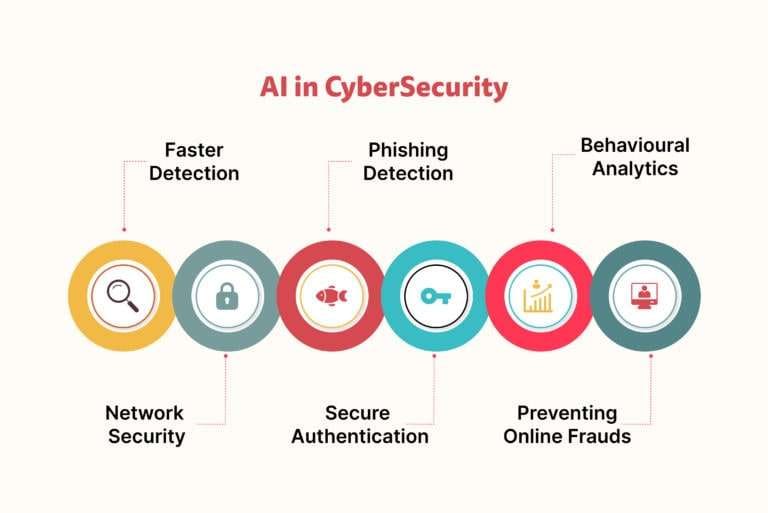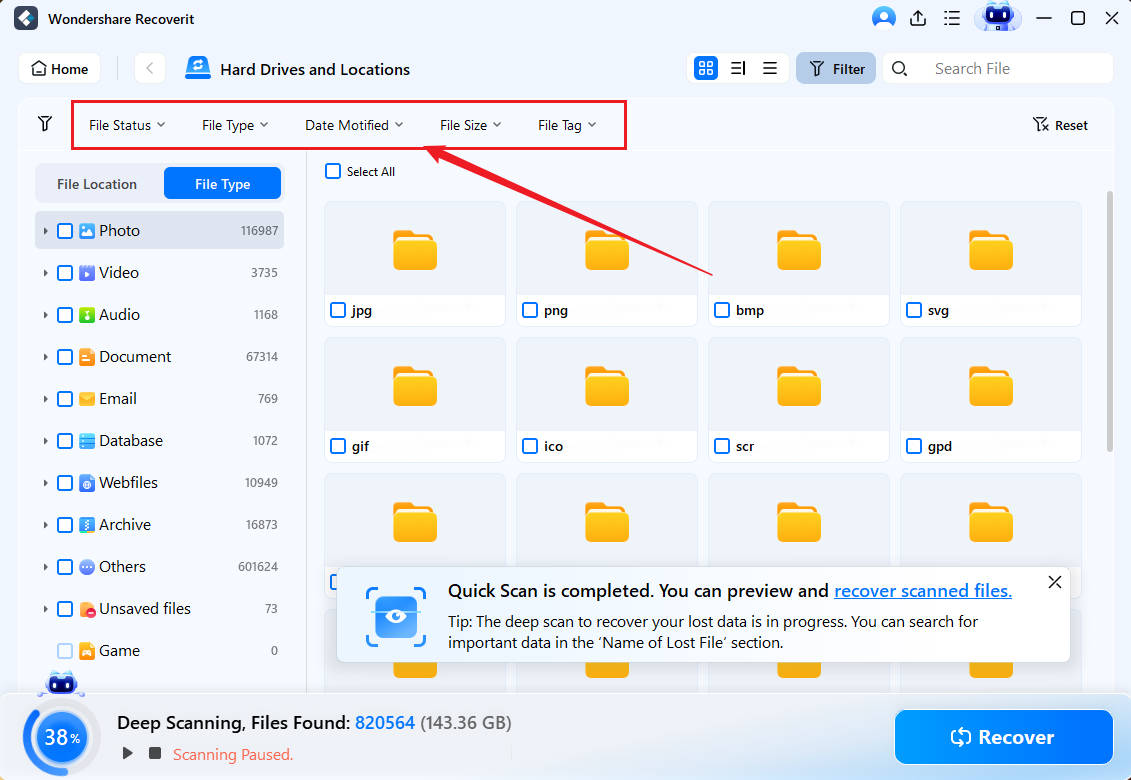Data has become the lifeblood for businesses of all shapes and sizes and individuals today. Just like enterprises use AI to improve their cybersecurity measures, hackers also rely on AI to reshape their cyber attack methods and find new ways to penetrate corporate protective measures.
In this guide, let's delve deeper into the role of AI in data security in 2023 and look at future trends in data security using AI.
In this article
Unraveling Data Security Using AI
Data Is Critical in This Digital Age
Data is of vital importance in the digital era. It drives the digital business landscape and powers every piece of tech you use daily. In the internet-driven age, data is the primary asset for every enterprise.
It helps organizations drive efficiency, innovation, decision-making, etc. Data also empowers companies to monetize their data sets, develop new products, launch game-changing digital services, personalize the customer experience, improve operational efficiency, and more.

Just like data benefits organizations, it can also benefit individual users.
Nowadays, internet users have access to numerous data-driven services, such as instant spell-checkers, fraud detection tools, spam prevention, digital mapping, mobile traffic services, and language translation, that help them streamline their everyday activities.
Thanks to data, internet shoppers can tap into innovative business solutions, reinforced security in online transactions, and personalized customer experiences. All this can help them save time and money.
The State of Data Security Using AI in 2023
Here's a breakdown of data security challenges and opportunities for your consideration on today's data security state.
The challenges:
- Data proliferation – Balancing between data accuracy and security effectively is one of the main data proliferation challenges for modern enterprises due to their data repositories growing rapidly.
- Sophisticated cyber attacks – hackers have access to increasingly sophisticated cyber attack methods, such as identity theft, data breaches, ransomware threats, malware, etc.;
- Human error – though companies have the latest, advanced security tools at their disposal, human error remains one of the leading causes of cyber attacks like data breaches;
- Regulatory frameworks – many companies struggle to meet strict data privacy regulations and protection laws, such as the California Consumer Privacy Act (CCPA) and the General Data Protection Regulation (GDPR).
The opportunities:
- Improved threat detection – compared to traditional security methods, AI-powered cybersecurity tools can detect and mitigate potential cyber threats before they escalate.
- Adaptive defense – AI cybersecurity tools are capable of learning from every incident and applying that knowledge to adapt to protect data;
- Personalized security – users can tailor AI-powered cybersecurity solutions to their individual needs;
- AI advancements – the latest AI developments open new opportunities in the data security field;
- Automation – AI lends users the power of automation to help them automate mundane and repetitive security tasks and save time, effort, and resources in the process;
AI holds immense potential for making groundbreaking changes to protect data. As the technology evolves, its impact on data security and privacy will become irreplaceable.
How ML and AI Can Improve Data Security
Artificial intelligence and machine learning are gaming-changing data security and privacy technologies.
Their ability to swiftly analyze and process vast volumes of data allows AI and ML cybersecurity solutions to recognize cyber-attack patterns and recommend the best ways to mitigate threats in real time. Because of that, AI and ML tools are paramount to protecting your data.
Current Applications of AI in Data Security
In data security, AI has many applications. Since it's scalable, fast, accurate, and cost-effective, businesses use AI cybersecurity tools for various purposes, such as:

- Incident mitigation – AI is the key to ensuring instant response to cyber threats. It automates incident mitigation tasks, such as damage recovery, deploying fixes, and incident management. In addition, AI excels at forecasting future incidents and taking action accordingly.
- Risk evaluation – since AI analyzes every attack on your database, it can use threat intelligence to identify the strengths and weaknesses of your company's cybersecurity and ascertain potential entry points that hackers might exploit.
- Malware detection – AI and ML cybersecurity tools can detect, isolate, and mitigate malware before it infects your systems. They can even adapt to the latest malware forms.
- Intrusion prevention – one of the best perks of AI in data security is stopping attacks from unauthorized network traffic, including threats originating from within your ranks.
- Phishing remediation – AI tools use machine learning and natural language processing to analyze email and their content and structure to spot malicious attachments, flag phishing attempts, and block hacked accounts.
In addition, banking institutions and financial companies use AI to prevent fraud and detect money laundering by monitoring millions of transactions 24/7/365.
Benefits of AI in Data Security
AI-powered cybersecurity can be a vital line of defense against cyber attacks for your organization. AI benefits your cybersecurity efforts in various ways:

- It helps you detect and mitigate the latest threats faster than traditional security methods;
- AI makes cybersecurity cost-effective by mitigating most threats before they damage your systems, affect your network, and access your data.
- It allows you to gather intelligence on every threat to your system and find the best ways to address discovered anomalies;
- AI cybersecurity solutions can seamlessly scale with your organization and help you reduce response times to security attacks;
Though AI offers numerous cybersecurity benefits, it comes with a few downsides you should know about.
Threats of AI in Data Security
Using AI in cybersecurity isn't without a few risks here and there. All technology is prone to specific issues if you take a close look.
The most common challenges of using AI in cybersecurity include:
- Regulatory issues – AI solutions are subject to ever-changing regulatory requirements, which slow down the adoption of AI-powered cybersecurity tools due to increasing privacy concerns;
- Increasing data needs – AI systems require vast amounts of training and operating data to work, posing a challenge for users with limited budgets;
- Complexity – many business teams still struggle to understand AI systems, making ensuring proper cybersecurity measures challenging;
- AI in the hands of cybercriminals – just like you have access to AI cybersecurity tools, so do hackers. However, their tools serve a completely different purpose: to breach security measures and steal data.
To help you understand these risks better, let's have a look at some of the examples of AI in cybercrime:
- Hackers use AI to launch new malware attacks that can bypass detection and infect your systems and networks with innovative zero-day vulnerabilities;
- Cybercriminals can create targeted and sophisticated phishing attacks that most companies can't deal with;
- Malicious third parties can develop AI-enabled audio or video deepfakes to trick victims into social engineering experiments.
Future Trends of Using AI in Data Security

AI has a bright future in the data security sector. Here are a few trends you can expect to see in the coming years.
Post-quantum cryptography
The development of quantum computing has brought new challenges for data security, as it helps hackers overcome current encryption methods. AI will help develop quantum-resistant and hack-proof encryption techniques to prevent future attacks.
Deep learning-powered threat detection
Though many organizations already use deep learning to detect threats, we can expect to see wider adoption of this cybersecurity technique. It can analyze system logs, network traffic, and massive datasets to identify hidden threats that legacy systems might miss.
AI-enabled data privacy
AI-enabled data privacy techniques are already in place to ensure maximum user privacy. AI will extend these efforts to help individual and business users cope with the ever-shifting regulatory compliance requirements by performing real-time analytics without compromising user privacy.
Balancing data security and privacy
AI will play a critical role in balancing data security and privacy in the foreseeable future. In other words, new AI security solutions won't use invasive techniques to acquire data for ensuring user security.
Cybersecurity training
In the years to come, businesses will heavily invest in educating their workforce on the benefits and applications of AI in cybersecurity to help employees learn to use AI-powered solutions, recognize cyber threats, and understand the consequences.
Can AI Prevent Data Loss in Case of an Attack?

AI-powered cybersecurity tools can detect and protect high-risk and sensitive data assets. To ensure maximum data privacy, they can classify resources according to their importance levels. In addition, they can actively browse your systems and networks for vulnerabilities to provide 24/7 protection and data security.
However, hackers can bypass AI-powered cybersecurity by launching adversarial attacks that can fool machine learning algorithms. In such a case, the cyber attack will result in data loss. So, what can you do in such a situation?
You can use a data recovery tool like Wondershare Recoverit to regain your data. Recoverit can help you preserve your data across data loss scenarios and recover your data stored in hard drives, storage devices, crashed systems, and more.
Download, install, and launch Recoverit on your device and follow these steps to recover your data from a malware-infected computer.
- In the File Recover menu, select Hard Drives and Locations;
- Select a hard disk in the Hard Disk Drives section or an external storage device in the External Drives tab to start the recovery process;
- Click Start;

- Allow Recoverit to automatically scan the selected drive for retrievable data;

- Use filtering tools to pinpoint data for recovery;

- Once Recoverit completes the scanning process, preview the results, select the files you wish to retrieve, choose where you want to save them, and click Recover to get your data back.

Conclusion
AI is swiftly becoming a necessity all internet users can't do without. It has the potential to reshape how you interact with your devices, house utilities, business services, and the internet. Naturally, such a monumental technology will continue to play a critical role in improving your cybersecurity efforts, including the performance of IT security experts in the time to come.
At the moment, AI is at the very heart of security solutions that protect enterprise-level networks and systems. Without AI, it will become impossible to protect data security or ensure data privacy in the internet-driven world.




